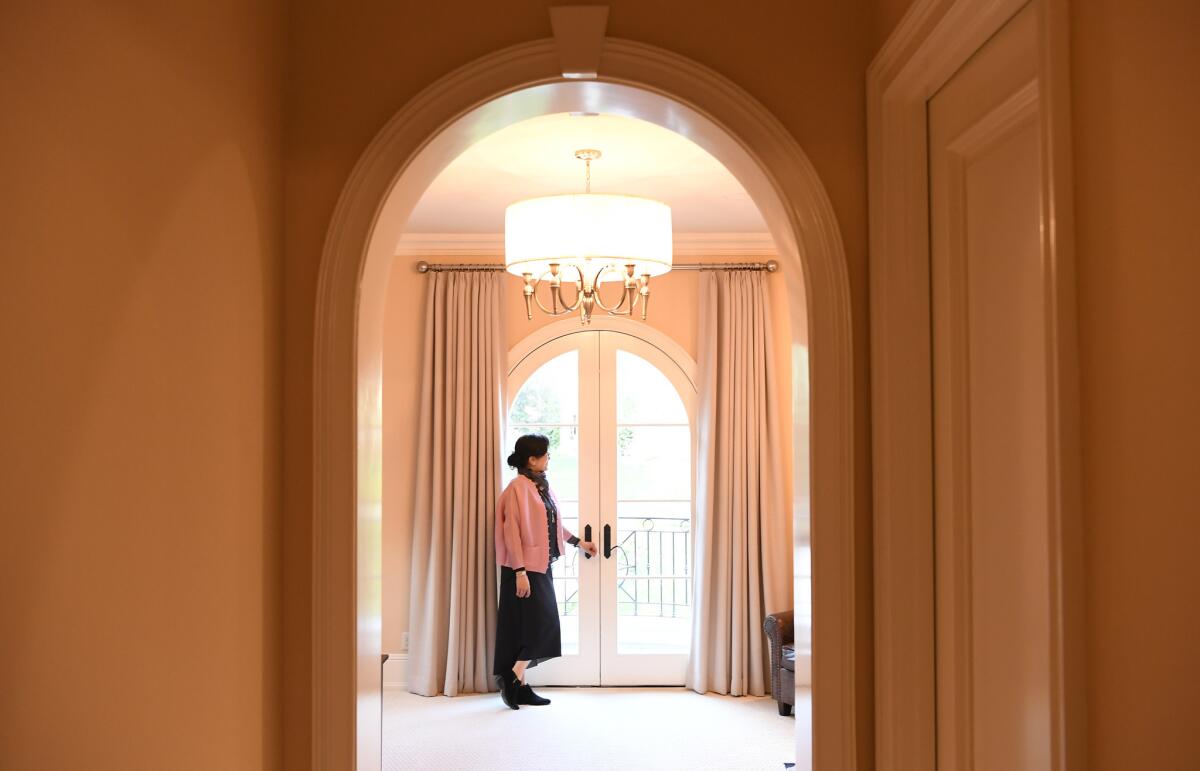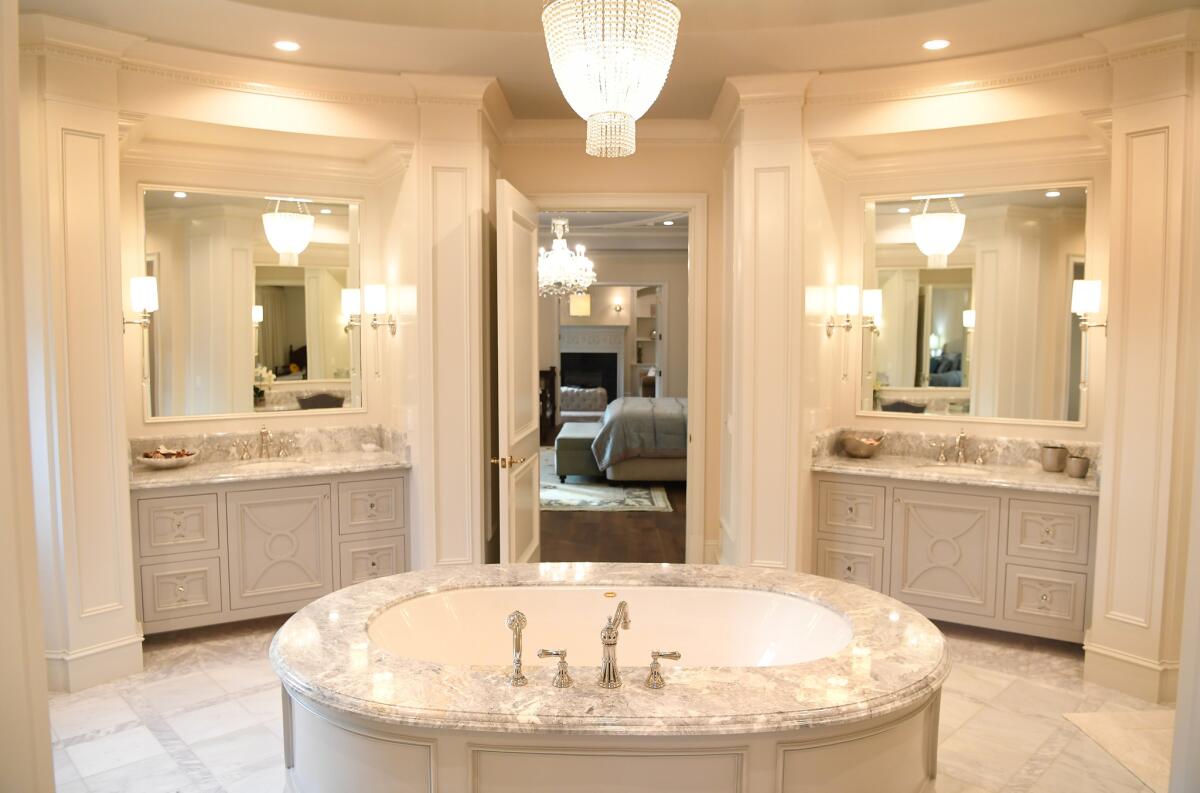Mega-mansions in this L.A. suburb used to sell to Chinese buyers in days. Now they’re sitting empty for months
- Share via
The mansion on Fallen Leaf Road in the secluded Upper Rancho neighborhood of Arcadia has all the trappings a wealthy buyer from China could want: a crystal chandelier in the entryway, marble floors, a home theater outfitted with a dozen reclining leather chairs and, naturally, a fortuitous eight bedrooms and eight bathrooms.
At $9.8 million, the recently built property is a relative bargain. A similar-sized home in Beijing would cost twice as much.
For the record:
8:41 a.m. Feb. 22, 2025A previous version of this story misspelled Veling Tsai’s name.
Yet two months after it was placed on the market, the house remains unsold. Not long ago, real estate like this would have been snapped up almost immediately.
“It would have been gone in two weeks with multiple offers,” said Dee Chou, the property’s listing agent.
Other real estate agents in the area report luxury homes geared toward Chinese buyers taking up to half a year to unload.
“All agents are crying that the money isn’t coming,” said Sanne Lee, an agent for A + Realty & Mortgage in Rowland Heights.
At the same time, high-end home seekers who plan to take out loans now have a fighting chance as they compete against a smaller pool of cash buyers.
Domestic buyers can now purchase here and not get blown out of the water.
— Brent Chang, real estate agent
The turnaround in activity, industry officials say, is directly linked to policies in China.
The San Gabriel Valley, long the destination of Chinese home buyers looking to provide their families a better living environment as well as safeguard their wealth in American assets, is feeling the effects of Beijing’s crackdown on capital flight.
Chinese citizens, wary of a faltering economy, have been pouring money abroad, fueling a buying spree of overseas assets in recent years that has pumped up property values from London to Los Angeles.
Though Chinese policymakers generally favor diversifying the country’s wealth into foreign holdings, they were unprepared for the magnitude and speed of the outflows. In order to invest overseas, Chinese citizens must dip into the country’s foreign exchange reserves. Those reserves peaked at $4 trillion in 2014 but have since dwindled by a staggering $1 trillion.
That has left the nation’s cache of foreign currency at its lowest level in almost six years — troubling a government in Beijing that needs the money to stabilize its currency and maintain good standing with the International Monetary Fund.
To defend against capital flight, Chinese regulators allow citizens to take out only $50,000 a year. But that’s been largely ignored and circumvented, often by asking dozens of friends and family to exercise their quota on someone else’s behalf.
“It’s like ants moving rice,” said Helen Chen Martson, a San Gabriel Valley real estate agent for Keller Williams.
The deluge in Chinese money made it exceedingly hard for local buyers to compete.
It took Veling Tsai, a doctor with a private practice in Alhambra, three years to buy a house after looking all over the San Gabriel Valley. He and his wife grew deflated after attending crowded open houses in Arcadia and San Marino, where Mandarin-speaking competition almost always made all-cash offers. The couple had five bids rejected.
“It was really frustrating,” said Tsai, 44, a Taiwanese immigrant who ended up paying $200,000 over asking price for a $1.5-million home in South Pasadena. “I think I make a good living. But even being a doctor, I couldn’t afford some of these houses because people were buying them like Starbucks coffees.”

But starting in 2015, Chinese banks began scrutinizing requests for foreign currency to ensure transactions were being used for legal business purposes. Regulators also increased their enforcement efforts given the many creative ways money is siphoned out — be it by forging trade invoices, smuggling jewelry and luxury watches out or even faking legal disputes to get cash into the hands of overseas lawyers.
Then on Dec. 31, China’s State Administration of Foreign Exchange, which swaps Chinese yuan for dollars, issued some of its strictest guidelines yet. Customers now have to pledge not to invest in foreign property and provide a detailed account of how foreign funds will be used. They also prohibited customers from taking foreign currency out for someone else.
The rules could have broad implications around the world for any city exposed to Chinese real estate investment such as Vancouver, Sydney and more recently, Seattle.
Few, of course, are as exposed as Southern California, where Chinese home buyers have expanded their reach beyond the San Gabriel Valley in the last decade to Orange and Riverside counties.
“Chinese policymakers realize that, without significant capital controls, the foreign reserves will continue depleting,” said William Yu, an economist at UCLA. “But those controls mean the Southern California real estate market, especially for luxury homes, will be less active because that money is stuck in China.”
Even before the new guidelines, signs were pointing to a slowdown in the kind of exuberant Chinese buying activity that sparked a frenzy in the San Gabriel Valley three years ago.
Cash purchases of homes — a loose proxy for wealthy Chinese buyers because they tend to pay in full — fell to 344 in Arcadia last year from 461 in 2014, according to real estate data firm CoreLogic.
In San Marino, cash sales stood at 86 last year, down from 103 in 2014. And in Alhambra, cash purchases have fallen from their peak of 208 in 2015 to 130 in 2016.
All told, cash sales in the San Gabriel Valley declined 17% between 2014 and 2016. In L.A. County, cash sales fell 12% over the same period.
The declines come even though all home sales grew by 5.7% in the San Gabriel Valley and 6.9% in L.A. County during that time.
Median home prices have dropped in Arcadia to $930,000 at the end of last year from about $1.1 million at the start of 2015. In San Marino, the median price for a home was $2.5 million as recently as the second quarter of last year before tapering to $2.2 million by the fourth quarter.

The slowdown isn’t necessarily a bad thing, said Ann Sung, founder of Chateau Group, a luxury developer headquartered in Arcadia, who believes the pace of sales in 2014 was unsustainable.
“Cash sales in two weeks with 15-day escrows is abnormal,” Sung said. “People were buying blindly. The market is now normalizing.”
The drop in cash sales has also allowed more traditional home buyers with loans to crack into exclusive markets such as San Marino, local agents say.
“Domestic buyers can now purchase here and not get blown out of the water” by Chinese money, said Brent Chang, who works alongside his mother, Linda Chang, a real estate agent in San Marino since the 1970s.
The duo say the slowdown in buyers from China began at the end of 2014. Houses that used to get 15 offers now get about half that. Prospective Chinese buyers have recently asked for six-month escrow periods rather than the usual 30 days to accumulate funds. The hope is that their all-cash offers are enough to entice sellers to wait.
Those long waits are also taking place in Arcadia, a city of 60,000 (60% of whom are Asian) that epitomizes the Chinese mansionization phenomenon.
Across the city, 1940s ranch-style homes were sold, torn down and replaced with hulking, multimillion-dollar European-style mansions designed by a handful of Chinese American firms. The emergence of the new properties became so divisive, the City Council introduced regulations last year limiting the size of new homes.
“We ended up with a bunch of homes purchased with no one living in them,” said former Arcadia Mayor Mickey Segal, echoing concerns that some of the properties were merely intended for investment to the detriment of the community.
Today, agents say the city is left with a surplus of luxury properties whose sellers could face pressure to reduce prices. One agent said her client had to drop his asking price for a property in Arcadia last summer to $8.3 million from $10 million because it drew no interest for three months.
Chou, the agent for the Fallen Leaf Road mansion, is more optimistic. It’s only a matter of time, she said, before Chinese buyers overcome the new capital controls in the perpetual cat-and-mouse game with regulators. The desire to invest abroad is an unstoppable force as many Chinese with means worry about their country’s slowing economy, weakening currency and oversaturated real estate market.
Moreover, her clients feel an obligation to relocate their spouses and children to the U.S. for better educational opportunities and to escape the pollution that envelopes much of China.
“Rich people,” said Chou, an immigrant from Taiwan who has lived in Arcadia for more than 30 years, “will always find a way to get their money out.”
Follow me @dhpierson on Twitter
ALSO
Stephen Dorff seeks $8.45 million for midcentury home on La Costa Beach
‘Downton Abbey’s’ Allen Leech finds a scenic spot in Studio City to manage
Former Secretary of State Condoleezza Rice sells Bay Area home for $2.3 million
More to Read
Inside the business of entertainment
The Wide Shot brings you news, analysis and insights on everything from streaming wars to production — and what it all means for the future.
You may occasionally receive promotional content from the Los Angeles Times.











